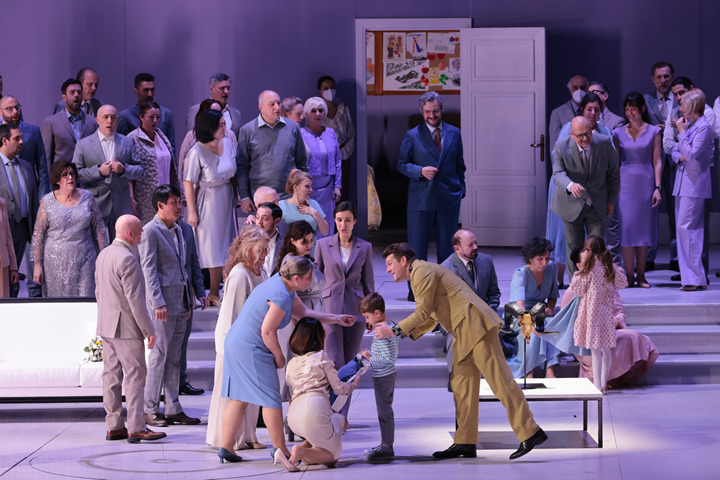| Opera Reviews | 29 April 2024 |
The original French version of Médée finally arrives at La Scala, with mixed resultsby Silvia Luraghi |
|
Cherubini: Médée |
|

General scene
|
|
|
Anticipated as one of the season’s highlights, Luigi Cherubini’s Médée finally made it to La Scala in its original French version over two centuries from its 1797 Paris premiere. The Italian version took about half of that time, having been shown in 1909, but it was only in 1953 and then 1962 that the opera, again in Italian, became famous thanks to Maria Callas' iconic interpretation of the title role, attracting the attention of filmmaker Pierpaolo Pasolini, who brought Medea and Maria Callas to the big screen. This can be considered the discovery of Cherubini’s opera in Italy, but also marked its doom, as the character of Medea got so closely connected with Callas that revivals have been infrequent in Italy, none of them being shown in Milan. In Italy, the French version was performed at Martina Franca’s Festival della Valle D’Itria in 1995 with substantial cuts. A challenging issue with the original version is constituted by the spoken dialogue, which since the mid-19th century has been routinely replaced by the recitativi written by Franz Lachner, originally for the German version. For the current production, it was decided to not only present the original French libretto, but also to restore the spoken dialogue in place of Lachner’s recitativi. What might at first sight look like a philologically oriented choice turned out to be the opposite: as spoken French diction is generally considered too demanding for opera singers, especially those who do not speak French as their native language. In this production director Damiano Michieletto, in collaboration with dramaturgist Mattia Palma, had them replaced by brand new dialogues intended to give voice to Medea’s children, heard from outside the stage in a recording featuring French actors. The children, two mute characters, were on stage most of the time, and constituted the real center of the action. Set designer Paolo Fantin staged the action in the living room of a middle class family, with a door on the back wall that opened on the children’s bedroom. At the opening of the second act, Médée writes Maman vous aime (“mother loves you”) on the wall, but the wall has cracked at the opening of the third act. Médée poisons her gift for Dircé in a briskly burning fire on the front of the stage. She then sends the children to bed; when kissing them good night she poisons them and locks the room’s door. The vocal cast was uneven. At opening night the title role was performed by soprano Marina Rebeka, who later became ill. I saw the performance of 20 January, when she was replaced by Maria Pia Piscitelli, who had recently performed the same role in Madrid, and bravely stepped in at the last minute. Considering the short time for preparation, she gave an excellent interpretation of the doomed and desperate outcast heroine from Colchis. At her side tenor Stanislas De Barbeyrac as Jason was not so compelling, especially because of some flaws in intonation. Bass Nahuel Di Pierro as Créon did not leave any memorable impression either. Much better were the other women, starting with soprano Martina Russomanno, a delicate Dircé tormented by doubt. Ambroisine Bré was a sympathetic and actively supportive Néris. A special mention is deserved for the two young actors Thomas Nocerino and Elisa Dazio, who performed the role of Médée’s children with gritty commitment. The orchestra was conducted by Michele Gamba, and the performance was met with appreciation by the large audience, with special applause for Piscitelli.
|
|
| Text ©
Silvia Luraghi Photo Brescia e Amisano © Teatro alla Scala |
|







